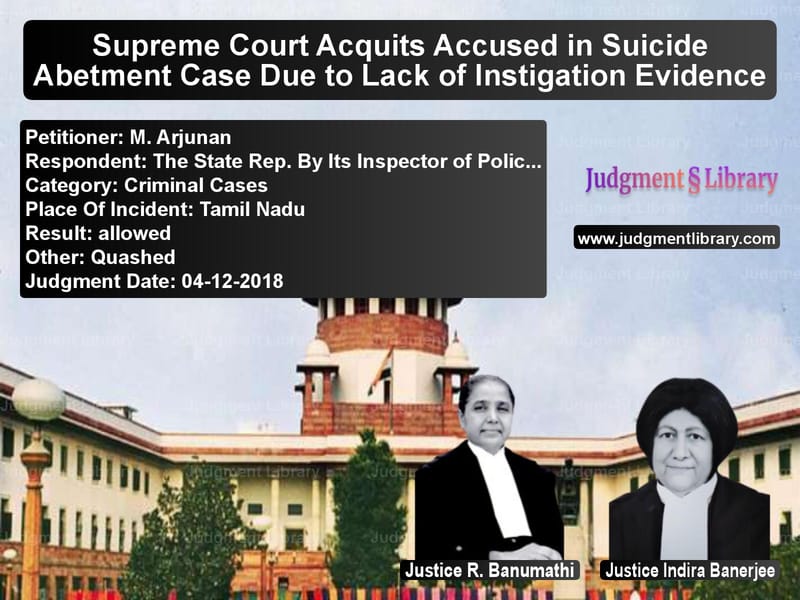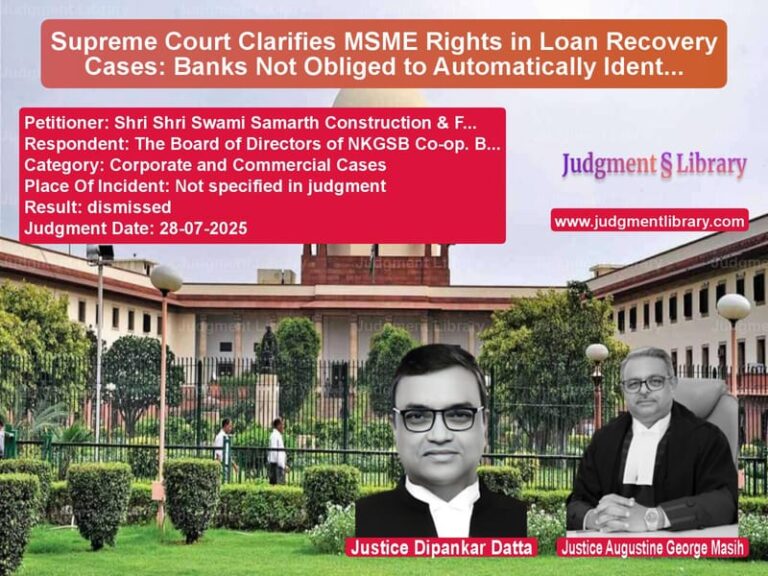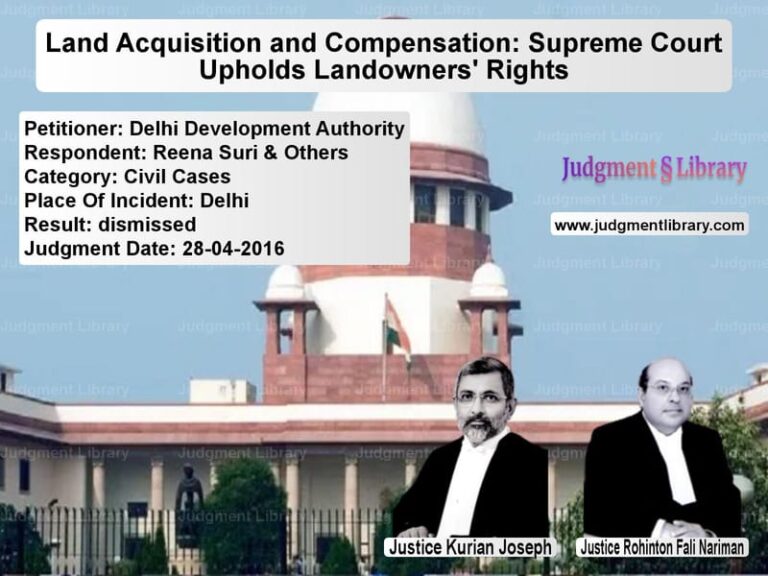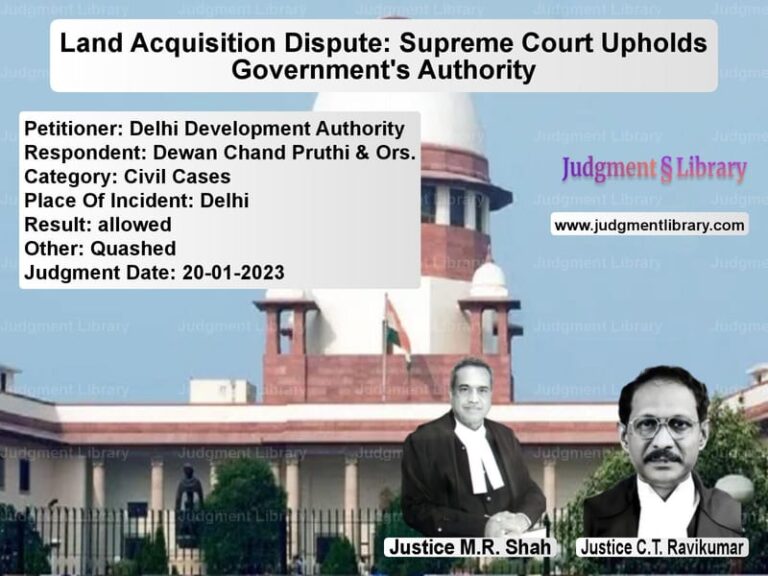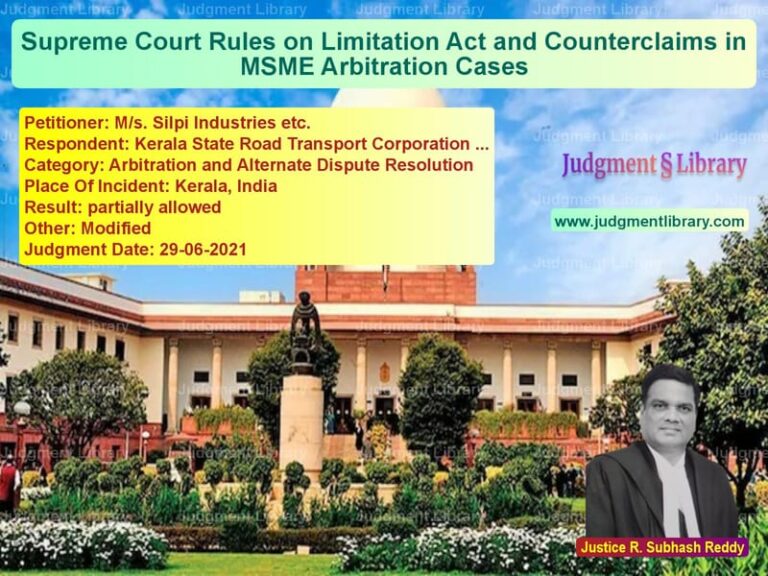Supreme Court Acquits Accused in Suicide Abetment Case Due to Lack of Instigation Evidence
The case of M. Arjunan vs. The State Rep. By Its Inspector of Police is a significant ruling concerning the essential ingredients of abetment of suicide under Section 306 of the Indian Penal Code (IPC). The Supreme Court overturned the conviction of the accused, stating that mere financial pressure or use of abusive language does not constitute abetment unless there is clear instigation.
The appeal arose from the decision of the High Court of Judicature at Madras, which upheld the conviction of the appellant for abetting the suicide of Rajagopal. While the High Court reduced the sentence from three years to three months, the appellant sought complete acquittal, arguing that there was no direct evidence linking him to the suicide.
Background of the Case
On December 2, 2001, the accused, M. Arjunan, advanced a loan of Rs.80,000 to Rajagopal, who in turn executed a promissory note. The prosecution alleged that due to continuous pressure from the accused to repay the loan, Rajagopal committed suicide on June 21, 2003. A suicide note (M.O.1) was found, in which the deceased mentioned his financial difficulties and his inability to repay the loan.
Key Legal Issues
- Whether financial distress caused by a debt can amount to abetment of suicide under Section 306 IPC.
- Whether the evidence, including the suicide note, established instigation or active abetment by the accused.
- Whether mere use of abusive language or pressure to repay a debt can lead to conviction under Section 306 IPC.
Petitioner’s (Accused) Arguments
The appellant contended that there was no direct evidence linking him to the suicide. His legal counsel argued:
“Mere financial transactions and insistence on repayment do not amount to abetment of suicide unless there is active instigation.”
He further stated that there was no coercion or threats that could establish a direct causal link between the actions of the accused and the deceased’s decision to take his own life.
Respondent’s (State) Arguments
The prosecution relied heavily on the testimony of the deceased’s family members and the suicide note, arguing:
“The deceased was under constant pressure from the accused, which pushed him into financial distress and ultimately led to his suicide.”
The prosecution further argued that the abusive language used by the accused in demanding repayment contributed to the mental agony of the deceased.
Supreme Court’s Observations
The Supreme Court, led by Justices R. Banumathi and Indira Banerjee, closely examined the evidence and noted:
“The act of the accused, however, insulting the deceased by using abusive language will not, by itself, constitute the abetment of suicide. There should be evidence capable of suggesting that the accused intended by such act to instigate the deceased to commit suicide.”
The Court further ruled:
“Unless the ingredients of instigation/abetment to commit suicide are satisfied, accused cannot be convicted under Section 306 IPC.”
Final Judgment
Considering the lack of evidence proving instigation, the Supreme Court set aside the conviction and ruled:
“From the evidence brought on record and in the facts and circumstances of the case, the ingredients of Section 306 IPC are not established and the conviction of the appellant-accused under Section 306 IPC cannot be sustained.”
The Court allowed the appeal, leading to the complete acquittal of M. Arjunan.
Significance of the Judgment
- Clarification of Abetment Law: The ruling establishes that financial disputes and verbal abuse alone do not amount to abetment of suicide unless there is a clear intent to instigate.
- Prevention of Misuse: The judgment prevents the misuse of Section 306 IPC in cases where there is no direct evidence of encouragement or provocation.
- Legal Precedent: It reaffirms the principle that criminal liability must be based on concrete evidence rather than assumptions about mental distress.
Conclusion
The Supreme Court’s decision in this case ensures that the law is not misused to criminalize financial disputes. By setting clear standards for abetment of suicide, the ruling safeguards the rights of individuals against unwarranted prosecution. This case highlights the necessity of proving intent and direct instigation to establish guilt under Section 306 IPC.
Petitioner Name: M. Arjunan.Respondent Name: The State Rep. By Its Inspector of Police.Judgment By: Justice R. Banumathi, Justice Indira Banerjee.Place Of Incident: Tamil Nadu.Judgment Date: 04-12-2018.
Don’t miss out on the full details! Download the complete judgment in PDF format below and gain valuable insights instantly!
Download Judgment: M. Arjunan vs The State Rep. By It Supreme Court of India Judgment Dated 04-12-2018.pdf
Direct Downlaod Judgment: Direct downlaod this Judgment
See all petitions in Suicide Cases
See all petitions in Fraud and Forgery
See all petitions in Judgment by R. Banumathi
See all petitions in Judgment by Indira Banerjee
See all petitions in allowed
See all petitions in Quashed
See all petitions in supreme court of India judgments December 2018
See all petitions in 2018 judgments
See all posts in Criminal Cases Category
See all allowed petitions in Criminal Cases Category
See all Dismissed petitions in Criminal Cases Category
See all partially allowed petitions in Criminal Cases Category

